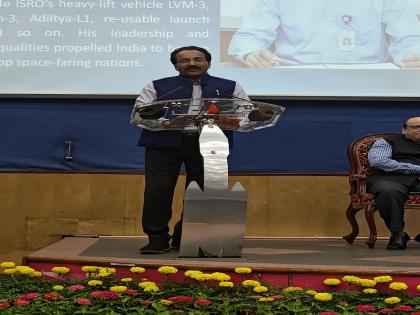“We Are Planning for the First Unmanned Mission Seeing Its Success We Will Perform Man’s Mission”: Dr. S.Somanath
By Anubha Jain | Updated: July 4, 2024 12:45 IST2024-07-04T12:42:46+5:302024-07-04T12:45:28+5:30
“Asteroids, the smaller, rocky remnants of the planetary formation process. In recent years there has been a growing awareness ...

“We Are Planning for the First Unmanned Mission Seeing Its Success We Will Perform Man’s Mission”: Dr. S.Somanath
“Asteroids, the smaller, rocky remnants of the planetary formation process. In recent years there has been a growing awareness to build planetary defence capabilities to safeguard the Earth from catastrophic asteroid impacts. Planetary defence involves early detection of such hazardous asteroids, their continual observation for better characterization and risk assessment and eventually devising a suitable risk mitigation strategy.” Stated by Dr. S.Somanath, Chairman ISRO and Secretary of the Department of Space in his inaugural speech while inaugurating the workshop on Planetary Defence today to commemorate World Asteroid Day at ISRO Bengaluru Headquarters. The workshop aimed to raise awareness on the impact threats of asteroids, the importance of asteroid research for a better understanding of our universe, and inspire the participants to find innovative solutions for planetary defence.
Somanath in his speech said that going to the moon is a different thing but asteroid learning is a challenging mission. Landing on an asteroid always remains problematic. Still, people have done it. Today India is in a significant position worldwide in the space sector. ISRO can understand and work on complex missions, he proudly added. In a one-on-one conversation with S.Somanath, Lokmat Representative Dr. Anubha Jain when asked about the strategy and ISRO’s mission similar to NASA’s DART (Double Asteroid Redirection Test) Mission to protect Earth from asteroid impacts, Somanath said, “Several scientific missions for asteroid exploration and sample return have significantly improved our understanding of the asteroids, the recent successful demonstration of kinetic impactor technology for asteroid deflection by DART mission has further spurred global interests in the field. As a leading agency, ISRO has also initiated focussed activities toward planetary defence. The Hayabusa Asteroid Mission is also a significant mission," he added.
When asked by the LT representative about the legal framework for asteroid mining, Somanath said that a few countries have made some framework but it's not legal, it is more of an aspirational framework and there is no legal authenticity for that.
Talking about Gaganyaan’s first flight Somanath assured, “We are planning for the first unmanned mission. Seeing its success and assessment we will perform man's mission. Our unmanned mission launch planning is in December this year. The first uncrewed test flight is planned for 2024, with a second uncrewed test flight and the first crewed flight planned for 2025.”Talking about asteroids' impact on Earth, he said, "Asteroids are not harmful but if they come closer to Earth’s gravity then it is dangerous for us. These asteroids destroy in space. It also depends on the size of the asteroid. The impact of an asteroid of size 10 km or bigger is regarded as an extinction-scale event, causing most of the species to perish due to its aftermath. Such an impact is hypothesized to have caused the extinction of dinosaurs." eplying to the question asked about dealing with space debris, Somanath said, “Space debris is manmade but asteroids are natural. Lakhs of machine parts, and nuts bolts have been created by humans in space as debris. We should not create it. It will be dangerous for India and other nations' satellites.”
In the end, talking about how asteroid names are determined, he said, "The scientist who first provides enough observations with precision has the privilege of choosing the name because they are the discoverers. "The workshop was attended by students and delegates from ISRO centres and academic institutions. Leading experts from JAXA and ESA delivered technical talks on the Hayabusa-2 asteroid mission, asteroid monitoring activities undertaken by ESA, and the role of the International Asteroid Warning Network and Space Mission Planning Advisory Group in dealing with asteroid impact threats.
Open in app